How is soil made?
Soil is a coming together of the Lithosphere (Earth), Atmosphere (Air), Hydrosphere(Water), and Biosphere (Life). These different elements are the most powerful and often unnoticed forces working together to break down solid rock. Overtime this breaking down of rock causes layers to form. These layers are referred to as horizons. Soil horizons can be seen alongside many roads in the banks of the road cut or in a hole dug for a foundation or septic tank.
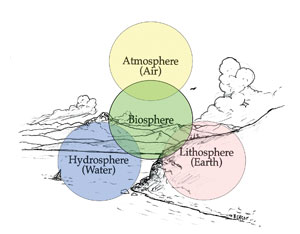
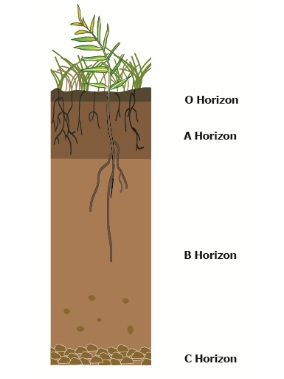
What are the Soil Horizons?
O – Organic Matter – Made of decomposing sticks, leaves, ect. (Bad for earthen construction)
A – Topsoil – Humus – Made of partially/mostly decomposed organic matter. (Bad for earthen construction)
B – Subsoil – Little to no organics found. Made up of various compositions of sand, silt, and clay. **This is the soil you want for earthen construction of any kind.**
C – Parent Rock – You will not be able to get your shovel through it.
What are Organics and why are they bad?
Organics are good for agriculture but not for making compressed earth blocks. The reason is that organic matter continues to breakdown over time while sand, silt, and clay are much more stable and will not rot away. We generally need to dig 8 – 10 inches down to get to the subsoil that is free of organics. Scraping the topsoil off a building site and storing it in a pile during construction is best practice for site excavation anyway as final site grading needs to be done with topsoil.

Composition of Soil vs. Sizes of Particles
The composition of the soil is the key to making good strong compressed earth blocks. There are an infinite number of combinations of sand, silt, and clay that exist in the world. Analyzing the soil composition takes lots of practice to become accurate when using basic field tests that you find all over the internet. You could take your soil to an engineering lab and get it tested there but it will cost you $250 – $500 to get your results. This challenge of understanding soils and mix design is why we have created this easy to use Mobile Soils Testing Lab.
The basic principle of a good mix design is to create the tightest possible particle matrix using the percentages of sand, silt, and clay available in the area.
To create the tightest particle matrix possible we want to combine all these together in the most efficient way possible so that little to no spaces exist between any of the particles when they are compressed.
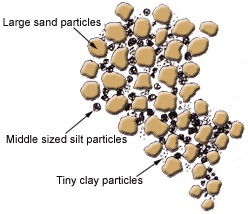
Gravel, sand, silt, and clay are all defined by their particle size. Gravel is the largest of the particles, then Sand, followed by silt, and finally clay is the smallest. The different combinations of these particles will give the soil its classification. Soils engineers use the Soils Texture Classification Triangle to classify soils so their behaviors and characteristics can be known for general design purposes. These same classifications are pertinent to earthen construction as well. The soils triangle below shows what kinds of soil types are best suited for compressed earth block production.
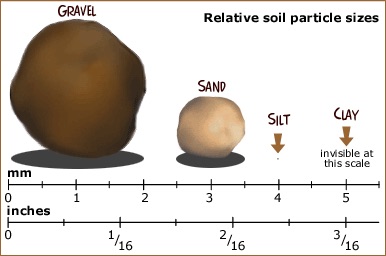
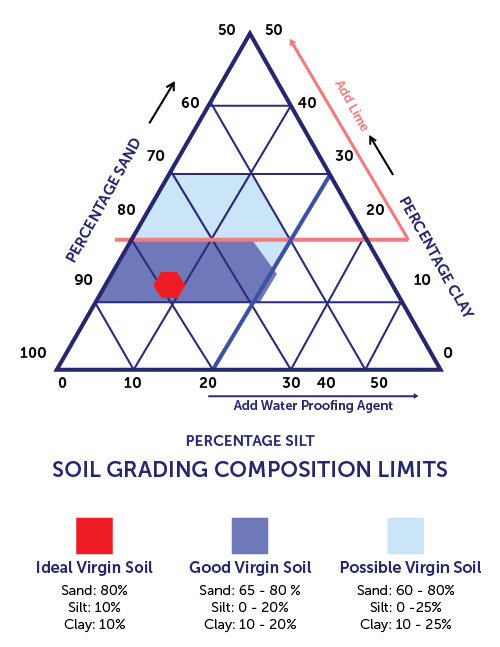
Do not let the triangle or the constraints make you feel like you need to have a very specific soil and/or live in a specific geographical location. You don’t! This is a huge range of soils that we are able to use to make good quality compressed earth blocks. We have done startup trainings in 19 different countries across Asia, Africa, North, Central, and South America and have never had one that did not have the needed soils for compressed earth blocks near by.
So get started analyzing your dirt by downloading our Soils Field Test Guide or for easier tests with more accuracy purchase a Mobile Soils Testing Lab. We are having an Earth Block Training event soon and we would love to have you. This is a great event to learn everything about compressed earth blocks. We cover soil science, block production, construction, and finishing techniques during this training. It is a great opportunity to learn about and experience compressed earth blocks to better equip you for your fundraising and/or project development mission so that you can see your vision come to life.
Attend Our Next Earth Block Training
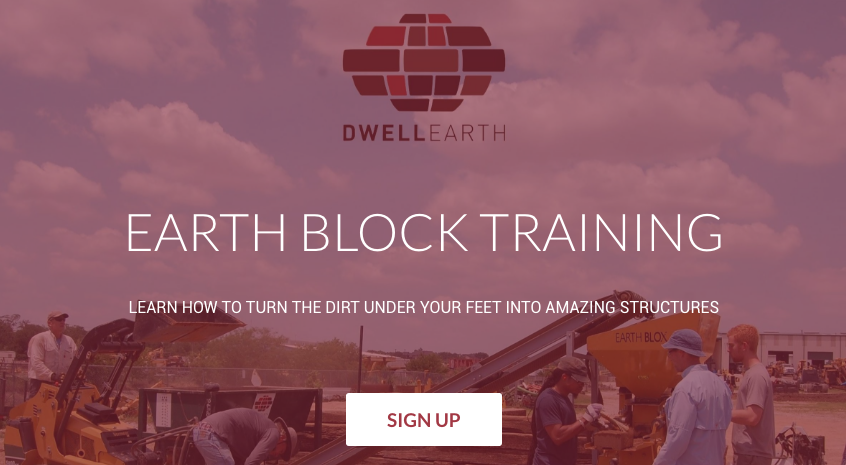

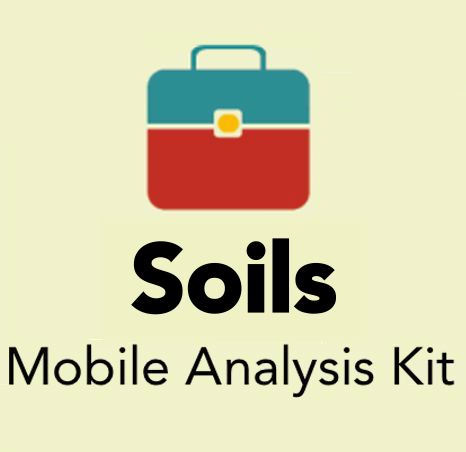
Please sent me the earth block machine price & let me know if it is could be shipped direct to dominican republic
is any training center based in INDIA.
needs more information on what type of soil can be used for compressed earth block production and is there training center for manufacturer in INDIA.
Absolutely. We ship anywhere in the world. We will email you shortly. Please use our contact form or email info@dwellearth.com with specific questions such as this so that we can quickly send you the information you need.
We have a partner in India who does trainings.
Your soil needs to have a little clay in it to make Earth Blocks. We have a manufacturer and training partner in India. Send us and email at info@dwellearth.com with your specific needs and we will get you the information you need.
hello my name is maurice from costa rica i want to know how much is the price for the machine and how much cost to send it here i want to build my house in my own thank you for all your help god bless you and i hope i can help to biuld other houses with this machine is for poor people
TMU referenced completing the Neural network on soil analysis program being finished this Spring 2017? Are the trainees in Jan/Feb 2017 kept up to date with new releases for a year or so?
is any training center based in pakistan.
i needs more information on what type of soil can be used for compressed earth block production and is there training center for manufacturer in pakistan.
We have training partners in India but not yet in Pakistan. We provide lots of useful information to teach you about soils science on our webpage. Use this link to access information on soils that are good for compressed earth block production and construction https://dwellearth.com/soil-science-2/
Our Earth Block Training program is designed to provide our students with a great foundation for Earth Block production and construction. We provide a tremendous amount of hands on experience during the training and equip all of our students with text manuals as well as a library of information, design templates, photos, videos, and other materials that they will always have access to the most current versions and updates. Our students always tell us that one of the most valuable aspects of our Earth Block Training is the network of people and projects around the world that we connect them with so that the learning can be ongoing and the collaborative. Click Here for more information about and to save your seat for our next Earth Block Training session.
Hi Maurice. Thank you for your comment and interest in building with Earth Blocks. We will be sending you some information to your email soon. All the pricing and information about our compressed earth block equipment is listed on our products pages. https://dwellearth.com/products-compressed-earth-block/
Just click the view product button for the desired Earth Block production equipment you wish to learn more about and you will find all the information for each machine on the page. If you have more detailed questions please CONTACT US
A great way to learn more about compressed earth block construction and production techniques is to attend one of our Earth Block Trainings. Click Here to learn more.
I want to detail of interlocking bricks manufacturing
Do you have an information kit with a full processing and list of equipment and prices?
Here is a link to our full equipment catalogue with pricing.